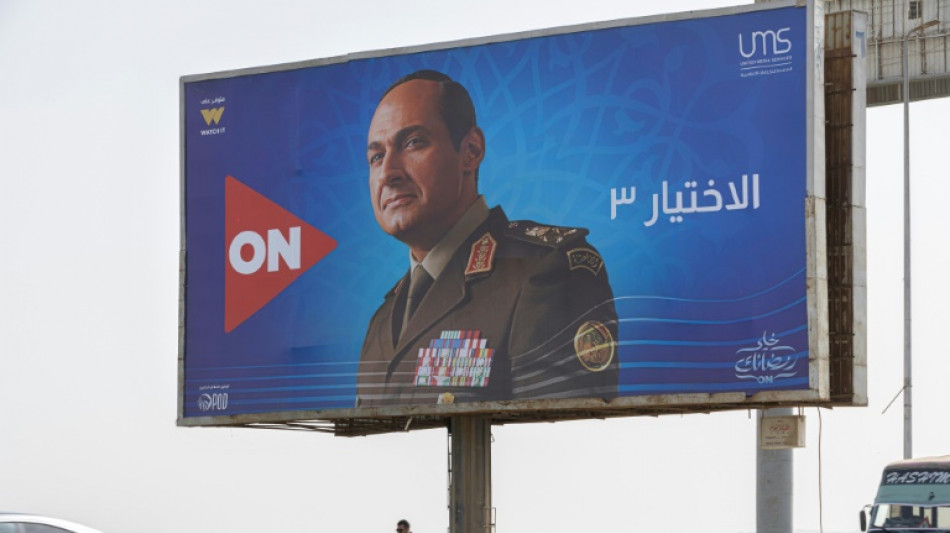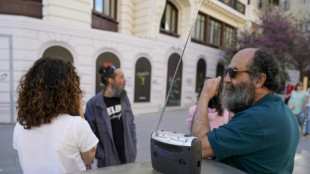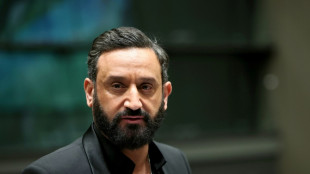

In Egypt, the president is a Ramadan TV hero
As Egyptians mark the Muslim fasting month of Ramadan, they are being treated to a blockbuster TV series that celebrates their army marshall turned president, Abdel Fattah al-Sisi.
Fans hail "Al-Ikhtiyar 3" (The Choice 3) for enlightening the masses about Egypt's turbulent recent history. Critics see it as propaganda by a regime that rules with an iron fist.
While the first two seasons paid tribute to soldiers who battle Islamist extremists and to national security agents, the third has 67-year-old Sisi as its central character.
The 30 episodes -- watched by millions after the traditional iftar sunset meals -- trace the path of the then-defence minister who in 2013 deposed Islamist president Mohamed Morsi on his path to becoming head of state.
Sahar Salaheddine, a columnist for state-owned newspaper Al-Goumhuriya, praised the army-sponsored series for "showing the love the people have for their president", and the actors for being "soft power ... soldiers".
The lead actor Yasser Galal has by all accounts mastered Sisi's mannerisms, his slightly arched eyebrows, pursed lips and signature whisper. Whatever Galal's acting skills, criticising his performance can be dangerous.
The Egyptian Front for Human Rights said that lawyer Nabil Abu Sheikha, after mocking the show on Facebook, was detained on April 11, accused of "disseminating false information" and belonging to a "terrorist" group.
While the state prosecution service did not comment on the case, local media reported citing unnamed "security sources" that Abu Sheikha was being prosecuted for an old case, without mentioning details.
Writer Shady Lewis Botros argued in an editorial that Galal's performance evoked "equal amounts of admiration and ridicule" and that, "like the regime's entire propaganda machine, it becomes a mechanical replication of itself".
- 'Educate new generation' -
The film studios of Cairo, long regarded as the Hollywood of the Arab world, have made on-screen heroes out of presidents before.
In 1996, "Nasser 56" told the story of Gamal Abdel Nasser nationalising the Suez Canal in a two-and-a-half-hour black and white epic.
In 2001, Nasser's successor Anwar al-Sadat got his own biopic, "Days of Sadat", with the lead role also taken by the actor who played Nasser, Ahmad Zaki.
But Al-Ikhtiyar isn't looking to the past, according to one of its screenwriters, Baher Dowidar, who says the show is made for Egyptians of the future.
In private newspaper Al-Watan, Dowidar said the series will serve as nothing less than "a history book" 50 years from now.
The goal, argues the local press, is to "educate the new generation" about Egypt, where over half of the 103-million-strong population is under 25.
Those who do not remember the summer of 2013 must be shown "the state's efforts to protect them from terrorism", said one state-owned newspaper.
- 'Unforeseeable turmoil' -
The show is a fictionalised look at Morsi's final 96 hours in power,
Morsi, who belonged to the Muslim Brotherhood, was elected in 2012 following the Arab Spring protests and died in prison in 2019.
A power grab saw the army depose Morsi then violently crush protests by his supporters in what Human Rights Watch called "one of the world's largest killings of demonstrators in a single day in recent history".
A highlight, the trailers for the TV show promised, was to be a series of leaked videos purportedly exposing Muslim Brotherhood leaders including Morsi.
One clip of apparently real-life footage shows Morsi warning the late field marshal Mohamed Tantawi, who was then the de facto president, of "unforeseeable turmoil" if he did not win the presidential election.
Though the series never sources the footage, it appears to have been shot by the military without the Islamist leaders' knowledge.
Lawyer Sherif Gadalla has said in an official complaint that he believes the video shows that Tantawi used to "secretly record his visitors", and argues that the footage should never have been leaked.
An ardent supporter of Sisi, Gadalla in his complaint targets the show's director and producer, not the government, reasoning that "the Egyptian state apparatus is far too intelligent to be the source of the leaks".
E.Winandy--LiLuX



